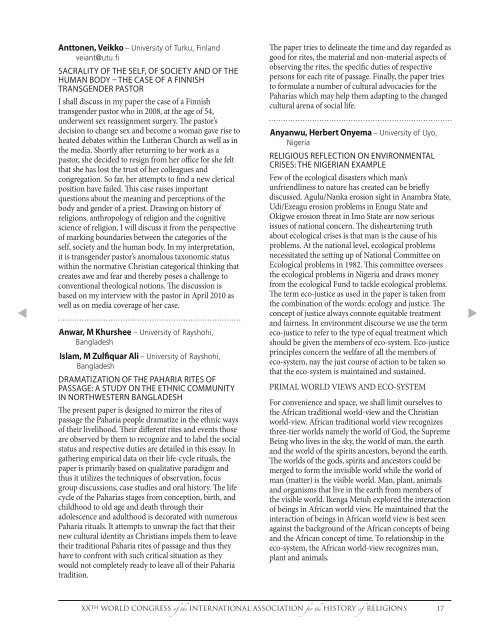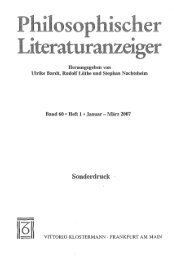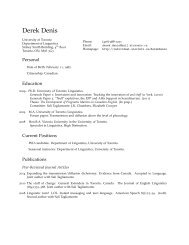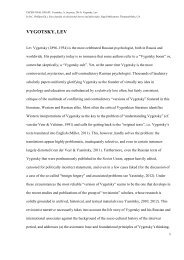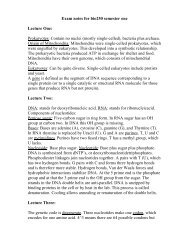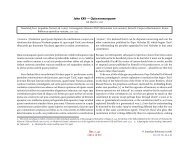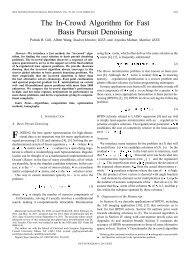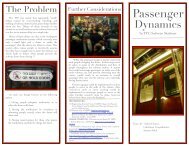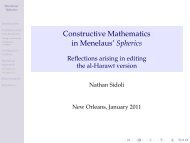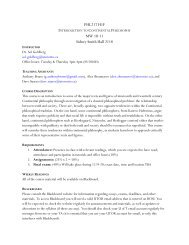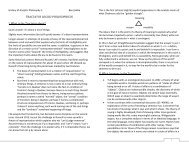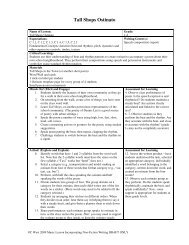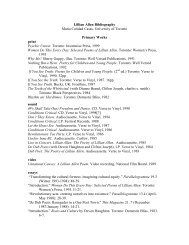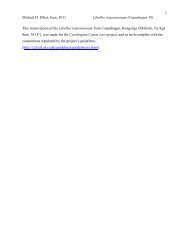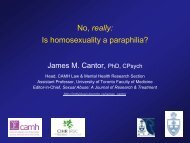BOOK of ABSTRACTS XXTh WORld COngReSS InTeRnATIOnAl ...
BOOK of ABSTRACTS XXTh WORld COngReSS InTeRnATIOnAl ...
BOOK of ABSTRACTS XXTh WORld COngReSS InTeRnATIOnAl ...
You also want an ePaper? Increase the reach of your titles
YUMPU automatically turns print PDFs into web optimized ePapers that Google loves.
Anttonen, Veikko – University <strong>of</strong> Turku, Finland<br />
veiant@utu.fi<br />
sacrality <strong>of</strong> tHe self, <strong>of</strong> society and <strong>of</strong> tHe<br />
Human Body – tHe case <strong>of</strong> a finnisH<br />
transgender Pastor<br />
I shall discuss in my paper the case <strong>of</strong> a Finnish<br />
transgender pastor who in 2008, at the age <strong>of</strong> 54,<br />
underwent sex reassignment surgery. The pastor’s<br />
decision to change sex and become a woman gave rise to<br />
heated debates within the Lutheran Church as well as in<br />
the media. Shortly after returning to her work as a<br />
pastor, she decided to resign from her <strong>of</strong>fice for she felt<br />
that she has lost the trust <strong>of</strong> her colleagues and<br />
congregation. So far, her attempts to find a new clerical<br />
position have failed. This case raises important<br />
questions about the meaning and perceptions <strong>of</strong> the<br />
body and gender <strong>of</strong> a priest. Drawing on history <strong>of</strong><br />
religions, anthropology <strong>of</strong> religion and the cognitive<br />
science <strong>of</strong> religion, I will discuss it from the perspective<br />
<strong>of</strong> marking boundaries between the categories <strong>of</strong> the<br />
self, society and the human body. In my interpretation,<br />
it is transgender pastor’s anomalous taxonomic status<br />
within the normative Christian categorical thinking that<br />
creates awe and fear and thereby poses a challenge to<br />
conventional theological notions. The discussion is<br />
based on my interview with the pastor in April 2010 as<br />
well as on media coverage <strong>of</strong> her case.<br />
Anwar, M Khurshee – University <strong>of</strong> Rayshohi,<br />
Bangladesh<br />
Islam, M Zulfiquar Ali – University <strong>of</strong> Rayshohi,<br />
Bangladesh<br />
dramatization <strong>of</strong> tHe PaHaria rites <strong>of</strong><br />
Passage: a study on tHe etHnic community<br />
in nortHWestern BangladesH<br />
The present paper is designed to mirror the rites <strong>of</strong><br />
passage the Paharia people dramatize in the ethnic ways<br />
<strong>of</strong> their livelihood. Their different rites and events those<br />
are observed by them to recognize and to label the social<br />
status and respective duties are detailed in this essay. In<br />
gathering empirical data on their life-cycle rituals, the<br />
paper is primarily based on qualitative paradigm and<br />
thus it utilizes the techniques <strong>of</strong> observation, focus<br />
group discussions, case studies and oral history. The life<br />
cycle <strong>of</strong> the Paharias stages from conception, birth, and<br />
childhood to old age and death through their<br />
adolescence and adulthood is decorated with numerous<br />
Paharia rituals. It attempts to unwrap the fact that their<br />
new cultural identity as Christians impels them to leave<br />
their traditional Paharia rites <strong>of</strong> passage and thus they<br />
have to confront with such critical situation as they<br />
would not completely ready to leave all <strong>of</strong> their Paharia<br />
tradition.<br />
The paper tries to delineate the time and day regarded as<br />
good for rites, the material and non-material aspects <strong>of</strong><br />
observing the rites, the specific duties <strong>of</strong> respective<br />
persons for each rite <strong>of</strong> passage. Finally, the paper tries<br />
to formulate a number <strong>of</strong> cultural advocacies for the<br />
Paharias which may help them adapting to the changed<br />
cultural arena <strong>of</strong> social life.<br />
Anyanwu, Herbert Onyema – University <strong>of</strong> Uyo,<br />
Nigeria<br />
religious reflection on environmental<br />
crises: tHe nigerian examPle<br />
Few <strong>of</strong> the ecological disasters which man’s<br />
unfriendliness to nature has created can be briefly<br />
discussed. Agulu/Nanka erosion sight in Anambra State,<br />
Udi/Ezeagu erosion problems in Enugu State and<br />
Okigwe erosion threat in Imo State are now serious<br />
issues <strong>of</strong> national concern. The disheartening truth<br />
about ecological crises is that man is the cause <strong>of</strong> his<br />
problems. At the national level, ecological problems<br />
necessitated the setting up <strong>of</strong> National Committee on<br />
Ecological problems in 1982. This committee oversees<br />
the ecological problems in Nigeria and draws money<br />
from the ecological Fund to tackle ecological problems.<br />
The term eco-justice as used in the paper is taken from<br />
the combination <strong>of</strong> the words: ecology and justice. The<br />
concept <strong>of</strong> justice always connote equitable treatment<br />
and fairness. In environment discourse we use the term<br />
eco-justice to refer to the type <strong>of</strong> equal treatment which<br />
should be given the members <strong>of</strong> eco-system. Eco-justice<br />
principles concern the welfare <strong>of</strong> all the members <strong>of</strong><br />
eco-system, nay the just course <strong>of</strong> action to be taken so<br />
that the eco-system is maintained and sustained.<br />
PRIMAL WORLD VIEWS AND ECO-SYSTEM<br />
For convenience and space, we shall limit ourselves to<br />
the African traditional world-view and the Christian<br />
world-view. African traditional world view recognizes<br />
three-tier worlds namely the world <strong>of</strong> God, the Supreme<br />
Being who lives in the sky, the world <strong>of</strong> man, the earth<br />
and the world <strong>of</strong> the spirits ancestors, beyond the earth.<br />
The worlds <strong>of</strong> the gods, spirits and ancestors could be<br />
merged to form the invisible world while the world <strong>of</strong><br />
man (matter) is the visible world. Man, plant, animals<br />
and organisms that live in the earth from members <strong>of</strong><br />
the visible world. Ikenga Metuh explored the interaction<br />
<strong>of</strong> beings in African world view. He maintained that the<br />
interaction <strong>of</strong> beings in African world view is best seen<br />
against the background <strong>of</strong> the African concepts <strong>of</strong> being<br />
and the African concept <strong>of</strong> time. To relationship in the<br />
eco-system, the African world-view recognizes man,<br />
plant and animals.<br />
XX tH WORLd CONGREss <strong>of</strong> the INtERNAtIONAL AssOCIAtION for the HIstORy <strong>of</strong> RELIGIONs<br />
17


